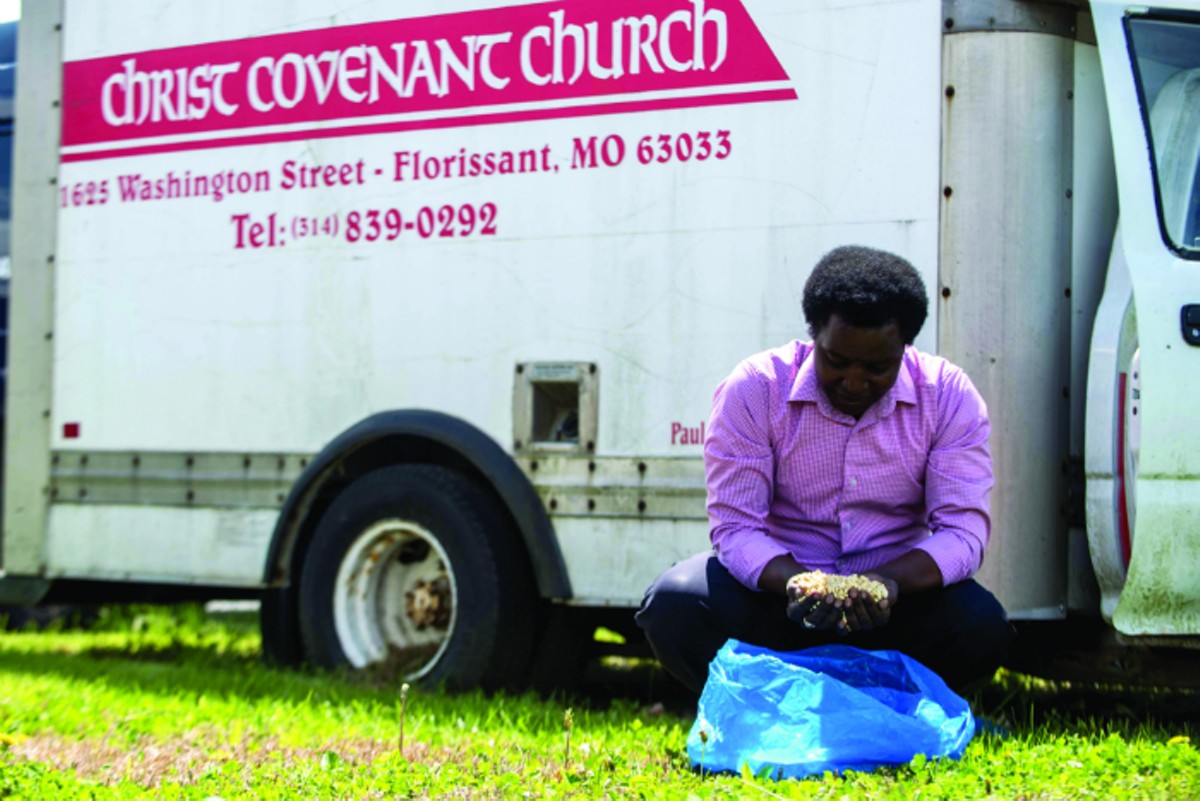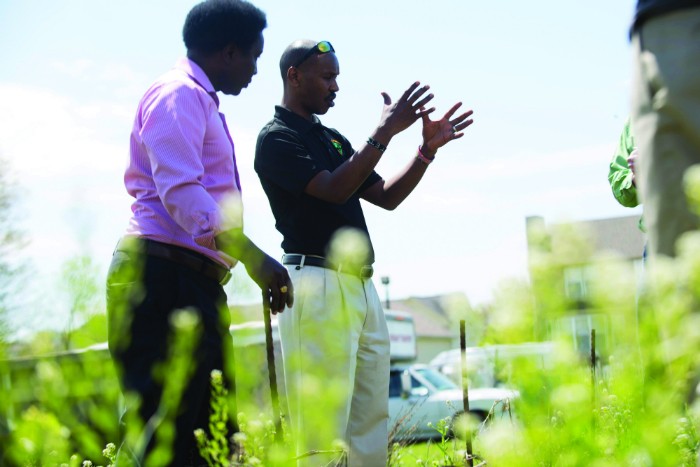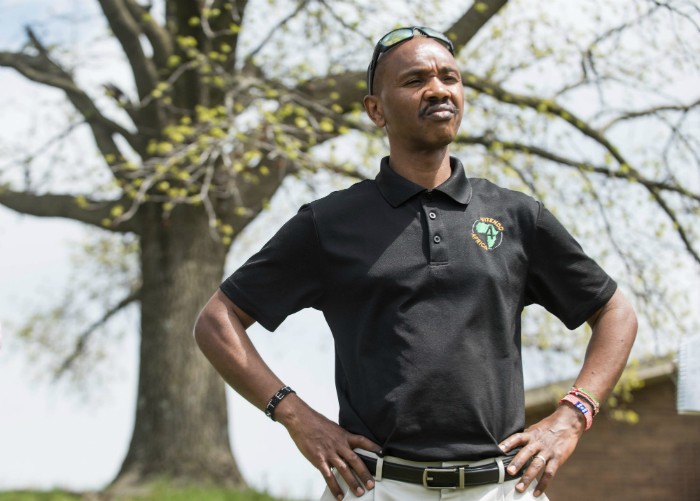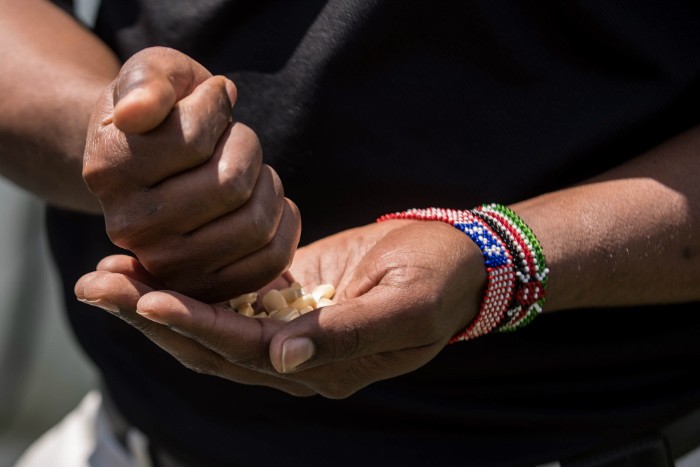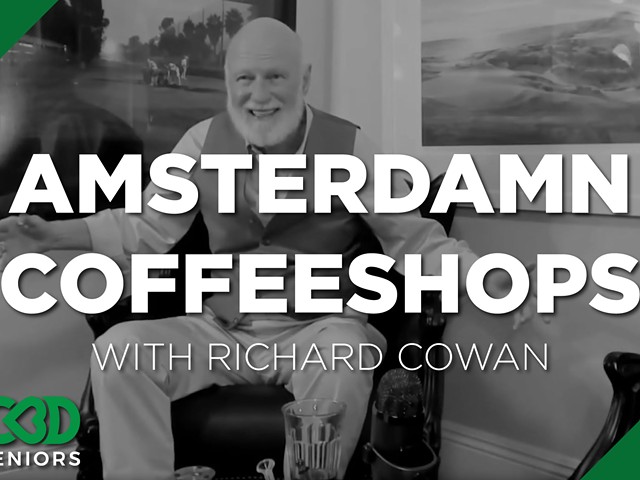Crouching over a cardboard box, Geoffrey Soyiantet peels back the strip of transparent tape that seals its top.
Soyiantet pops open the box, then stares at its contents. He smiles warmly, as if he had just opened a carton full of newly discovered treasure.
In a sense, he has. The box contains hundreds of white corn seeds, a staple of countless farms and gardens in Soyiantet's native Kenya.
"Look at this," he says as he scoops up a handful of seeds and shows them off to a visitor.
A few months ago, Soyiantet and fellow members of Vitendo4Africa, a social and economic support group for African immigrants in the St. Louis region, had envisioned planting the white corn, along with tomatoes, onions and other crops, in the eleven-acre plot of land behind Christ Covenant Church in Florissant.
But now on this warm and breezy day in April, with a cottony filament of clouds drifting lazily across a deep blue sky — a perfect day for working in a garden — the field remains unplowed. The only things growing in it are grass and weeds, yellow-tipped flowers, tiny sapling trees, the wispy remnants of last year's onion crop.
The COVID-19 pandemic has kept Vitendo4Africa members from working in their Shamba ya Kijiji (Swahili for "community garden"), because of the area's lockdown orders and fears of spreading the virus.
The fact that such a beautiful day in the garden is being wasted rankles Pastor Paul Macharia, the church leader, who stands a few feet away, gazing wistfully at the field.
"It is a punishment," Macharia says.
The garden, which was started last year in collaboration with the Saint Louis Zoo, was a source of fresh, organic food. But it also became a popular cultural touchstone for the St. Louis region's thriving African immigrant community, as well as a nexus for the homesick and a refuge from the stress and conflicts of an American culture so different from the one in which they had grown up.
"Coronavirus is keeping everybody away from the garden," says Soyiantet, Vitendo4Africa's founder and executive director. "We use it as a social way to connect and get together. For the older people, they use it as a therapeutic way to stay connected."
Because of the lockdown orders and steep jobs losses resulting from it, everyone is worried, especially the children, he says.
"They are really stressed out and worried about their friends," Soyiantet says. "They can't go to McDonald's ... or [go] for a bike [ride together]."
The stress of so many hours inside for young people is exacerbated by what they see on TV and social media, says Pastor Macharia, a native Kenyan who moved to the United States in the early 1990s to study at Maryville University, and who today leads St. Louis' rapidly growing African immigrant community.
"They see the news," Macharia says. "So many people dying and being buried. Especially in New York, or Washington State, or Italy. ... One thing they don't understand is why it happened all of a sudden. It was OK, but now all of a sudden people are locked in their homes. Where was this before?"
The current pandemic, coupled with an unprecedentedly ferocious economic downturn, poses big challenges for everyone.
But those problems are the latest in a litany of challenges the members of Vitendo4Africa have already been dealing with: from understanding American English, to finding jobs and credit and a place to stay, to dealing with cultural conflicts between immigrant parents and children who wish to adapt rapidly to the American way of life.
And then, of course, there is the anxiety of life under a president who uses his position in the White House as a megaphone to broadcast a constant stream of anti-immigrant policies and invective.
On top of all that, Vitendo4Africa members now worry about the fate of their collaboration with the Saint Louis Zoo on its North Campus project, a 425-acre site in Spanish Lake, near the confluence of the Missouri and Mississippi rivers.
The Saint Louis Zoo Association used private donations to buy the North Campus site from the United Association of Plumbers & Pipefitters Local 562. In November 2018, St. Louis County voters passed Proposition Z to help fund repairs to the zoo in Forest Park and to operate the North Campus. While a construction date hasn't been set, the zoo hopes to open the park over the next five years, according to the zoo website.
Once completed, the ambitious project would allow visitors to replicate an African safari where tourists in Jeeps could be surrounded by a group of curious giraffes. A conservation and animal science center planned for the site would help the zoo manage endangered animal populations.
But of course those plans were sketched before the worst pandemic and financial crisis in a century hit the St. Louis area — a vicious one-two wallop that's raising big questions about the project's timetable among Vitendo4Africa members.
It's hard to overstate how important the North Campus project is to Vitendo4Africa members, who have been helping with design and execution as well as outreach to the communities surrounding it.
The project stands as a symbol of their future while also serving as a powerful tether to their past, according to Macharia.
It would allow young people in the area to "have opportunities for the outdoors," Macharia says, "opportunities to learn. Opportunities to do camping. Opportunities to interact with wildlife. Most important is the mentorship aspect. Because we want to leave this legacy to our children. ... So when you become a good neighbor, the opportunities are there. That is our hope."
Billy Brennan, a zoo spokesman, says zoo officials are still finalizing plans for the site, and that they expect to finish construction sometime within the next five to six years.
But Brennan acknowledges the COVID-19 pandemic and accompanying economic downturn could pose obstacles to that timetable.
"The safe answer is I think it could very well set us back a bit, but we don't know," he says. "We're still dedicated to getting the North Campus rockin' and rollin' as soon as possible."
For his part, Soyiantet remains hopeful about the project, as well as the future in general.
"We can always reference what's happened in the past," he says. "And that gives us hope that we can come out of difficult times. Difficult challenges in the past, even this one, we'll be able to get out of and overcome it."
I first met Soyiantet last October. At the time, I was intrigued by Vitendo4Africa's collaboration with the Saint Louis Zoo, a partnership unlike any other in the United States. I wanted to learn more.
But I was also seeking something else: a reason to feel hopeful about the future.
For many years, a certain self-pitying sourness, a shift toward resentment and pessimism, had gripped many parts of the nation — places where the American Dream had been hijacked by something dark and ugly. And it was getting under my skin.
Truth is, people in large swaths of the United States, especially in rural Missouri and elsewhere, had given up on the American Dream.
Lots of books and articles offered plenty of explanations: the decline of organized Christianity; the seemingly unstoppable loss of millions of factory and farm jobs; soaring rates of income inequality; downward mobility for two generations of Americans; the fact that the United States' white majority is rapidly shrinking, and that within less than a generation America will be a majority-minority nation after 400 years or so of unquestioned white dominance.
Whatever the cause, Americans are dying in droves from this wave of pessimism. A 2019 report by the Commonwealth Fund found that the so-called "deaths of despair" — suicide, alcoholism and drug addiction — were soaring, especially in the states that voted for Donald Trump in 2016.
Trump, of course, had campaigned on a platform of racist populism and harsh anti-immigration measures. Once in the White House, he quickly surrounded himself with nativist extremists such as Stephen Miller, who made no secret of his desire to slash the number of dark-skinned immigrants coming to America.
I was curious to see how St. Louis' African community was holding up, how a group of men, women and children who had come to America, propelled by hope after surviving the horrors of war, genocide, plague and hunger, were doing after more than three years of Trump's racist invective.
But I also wanted to discover the key to their resilience.
Soyiantet, when we talked, refused to sugarcoat anything for me. Life was getting tougher, he told me in October.
"It's really scary," Soyiantet said of Trump's anti-immigrant rhetoric. "You don't know who will take his words seriously. ... Because of that, a lot of those in the African community live with a lot of fear. They think, 'I don't know who to trust now.'"
When I first spoke to Soyiantet, the Trump administration had just dramatically slashed the number of refugees and immigrants allowed to come into the United States. And more deep cuts in immigration flows were expected, dealing a severe blow to families already over here hoping to reunify with loved ones back in Africa.
"They received the lowest number in their history in this area," Soyiantet said.
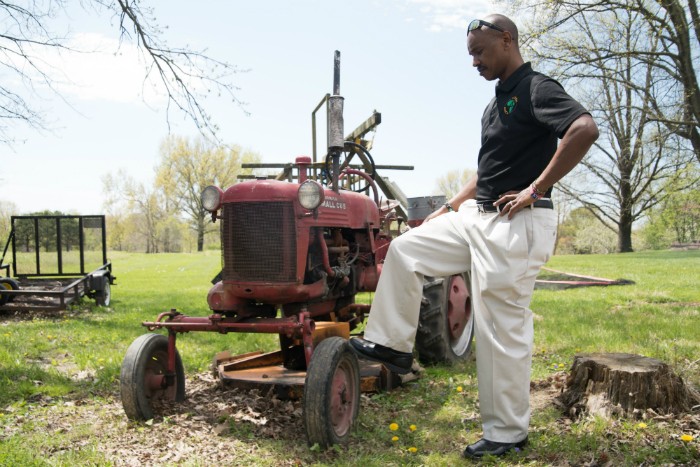
Flash forward six months.
It is late April when I meet Soyiantet and other Vitendo4Africa members at their garden. On the car drive there, I hear on the radio news story after news story about the brutal turn the economy is taking, plus the deadly toll of the pandemic.
On the same day that I meet these community members, Trump announces a 60-day ban on immigrants seeking green cards for permanent residency.
Trump justifies it as part of an effort to protect Americans seeking to regain jobs lost because of the coronavirus pandemic. Critics, however, slam Trump's new policy, flaying it as part of a partisan campaign to distract from his administration's slow and chaotic response to the pandemic.
One thing is clear: Native-born Americans are heading toward a new normal of economic hardship and fear. And they might learn a thing or two about getting through this crisis from someone like Jesil "Jesse" Kimani, who immigrated from Kenya in 2006.
Kimani is already feeling the heat from the economic downturn. He owns a trucking company that has lost 90 percent of its business in recent weeks because of the fast-developing recession, he says.
But Kimani still hangs on to hope. He already knows he will get through any setbacks in the United States. After all, he's survived much worse back home in Kenya.
"The good part is that, based on how we were brought up, and the challenges that we had gone through before, let me say, it's and opportunity," he says. "It's like, if you were used to lifting 150 pounds every day, up and down, and then somebody comes and gives you 80 pounds, as a punishment. It's really a kick to you. ... Just prepare for hardship. And when the hardship is over, use whatever is at your disposal and move forward."
Vitendo4Africa member David Githinji says his community has learned to survive by living "in our little cocoons. We became our brother's keeper. You pass the difficult times."
He adds, "The past President Obama has given us a lot of hope, and that little hope is keeping us going."
Vitendo4Africa is the Swahili word for "actions."
When Soyiantet launched Vitendo4Africa 4 Africa in 2010, he wanted to communicate that the group would be constantly on the move.
"We focused on the need for the African community so that we can connect them with different resources," he says.
Soyiantet, 45, grew up on a farm in rural Kenya and graduated with a degree in economics from Kenyatta University in Nairobi in 2004. Now married with three kids, Soyiantent arrived in the United States the same year he graduated after obtaining a visa through the Diversity Immigrant Visa, or "lottery," program.
He spent the next four years supporting himself as a dishwasher while working on a business degree from Lindenwood University. During this time frame — from 2012 to 2017 — the number of African immigrants in the St. Louis area surged, reaching more than 20,000, with the great majority settling in north St. Louis County.
One of the biggest challenges the African immigrants face centers on how they raise their children, Soyiantet explains.
"The parents come from a different environment. We want to bring them up the way we were brought up," Soyiantet says. "That brings up a lot of conflicts between the parents and the kids, especially the teenagers."
Because they are so eager to assimilate, the children of immigrants "are quick to forget the African culture," he says. "They feel the African culture is a primitive way of life, and they want to adapt to the American way of life, which the parents aren't ready to adapt to."
Another feature of American life that is hard to adapt to is its culture of gun violence, Soyiantet notes.
"It's really traumatizing to most," he says. "You run away from violence thinking you were going to a safer environment. Now when you hear about all the gun violence, the school shootings, that is really traumatizing. ... Everybody owning a gun, it's something we're not used to. And it's also very scary just to see somebody carrying a gun."
Meanwhile, as Vitendo4Africa 4 Africa was hitting its stride, a powerful anti-immigrant animus was building across much of the United States, especially in parts of the country that do not regularly encounter many immigrants, according to Anna Crosslin, president and CEO of the International Institute of St. Louis.
Such a backlash against immigratiion is especially counterproductive considering that the United States is losing population among native-born residents due to plummeting birth rates and aging.
"So the only way we build population to what it's been is by having enough people to fill jobs that are here, particularly skilled jobs," Crosslin says. "Building population is really important, and we're not managing to replace the loss right now in population, particularly in our city and county."
It's not just the job skills that immigrants bring, Crosslin adds.
"Immigrants are enormously resilient in many ways," she says. "They take that resilience and turn that into entrepreneurship. And so, if we are to continue to create the businesses that are important ... then we need to have robust immigration programs."
So why the backlash against immigrants in a nation built by immigrants?
Crosslin answers the question by pointing to a fear that has developed among many Americans that immigration poses a threat to something basic about the hope of America.
People who fear immigrants worry "that the essential hope of America is in jeopardy because there are too many people who are coming who are not like the people who are already here."
A profound shift has happened in rural parts of the country, according to Crosslin.
"Their optimism died," she says. "And when that optimism died, they looked around at that point, and then looked at immigrants and said, 'Oh, my God, immigrants are doing real well. What's happening? Why are they getting ahead and we're not?' They got sold a bill of goods along the way because they lost their optimism, because they lost their work, because the companies went overseas. They couldn't blame the corporations, so instead they blamed the immigrants because the immigrants, they thought, at least they were foreign-born."
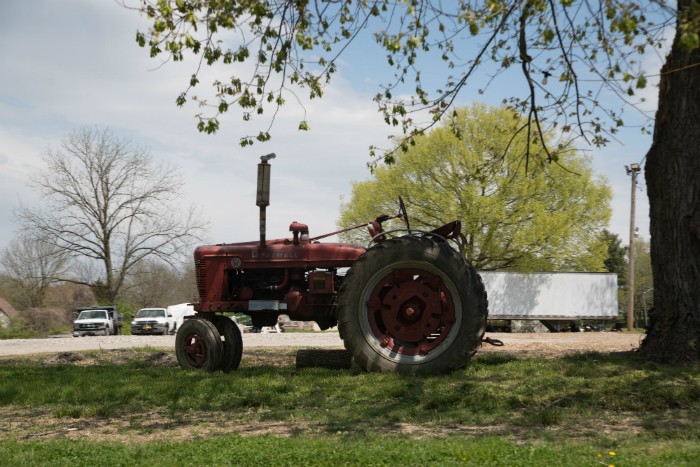
But, truth be told, the immigrants coming to the United States, even while they might look different from native-born white Americans on the outside, "share many of the common values and beliefs that America is based on and is really part of their psyche," Crosslin says.
"This is about life, liberty and the pursuit of happiness," she continues. "The very essence of what we as Americans are supposed to be and believe in. These are exactly the types of things immigrants believe in, regardless of the country from which they hail."
Back at the garden, Soyiantet considers the many good things that will soon be growing there. A garden is a symbol the world over of hope, of resilience, of a bond between humans and nature to nurture life.
Above all, it is a contract with the future, and — in a time of pandemic and economic crisis — a declaration about the present.
"The fact is that tough times don't last," Soyiantet says. "They last for a short time, and we'll get back to our normal life. It gives us hope that, yes, things will not be bad forever."

